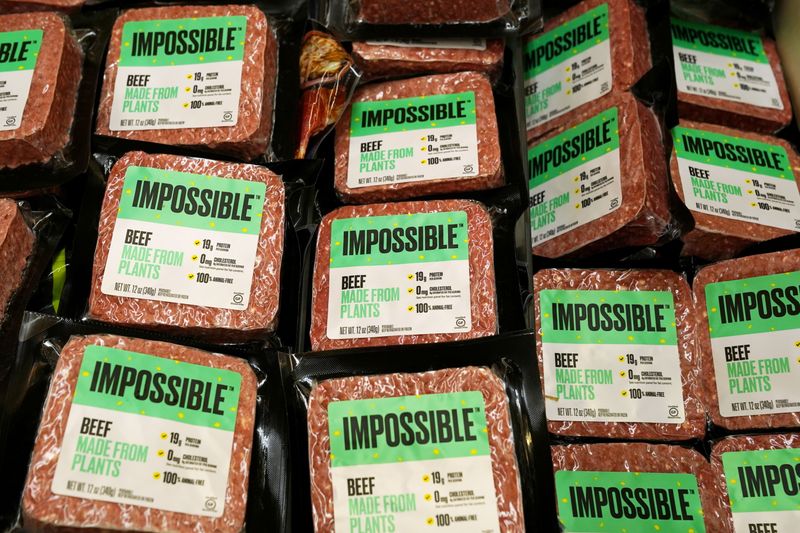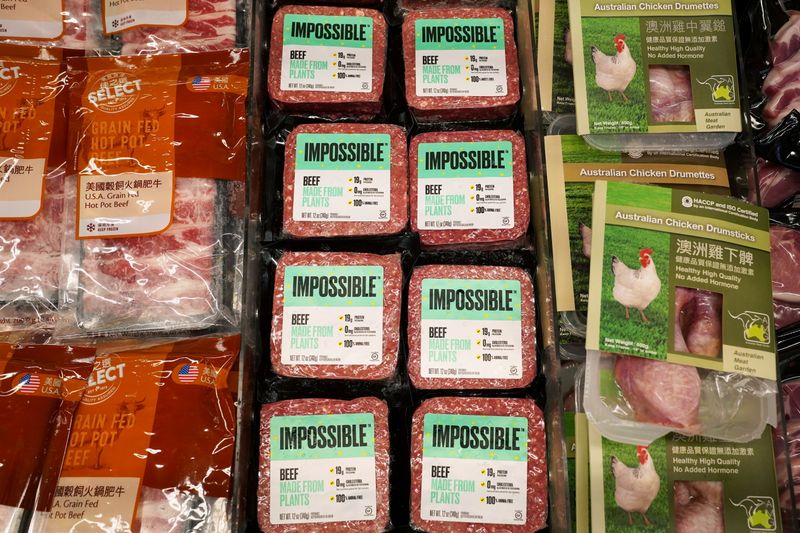By Siddharth Cavale and Uday Sampath Kumar
(Reuters) - A cooling of the U.S. stock market's taste for plant-based meat makers has raised doubts among some investors and analysts about Impossible Foods' plans to achieve a $10 billion flotation.
Impossible is seeking to go public through an initial public offering or via a merger with a blank-check company within the next 12 months, sources told Reuters this month.
The market value of larger competitor Beyond Meat (NASDAQ:BYND), however, has sunk from a peak of $14 billion to closer to $8.5 billion and is predicted by several brokerages to fall further.
Both firms carry expectations of being big players in a so-called faux meat market which some predict could be worth $85 billion a year by 2030 as dietary habits shift.
But with retail sales of some products sliding, four sectoral investors told Reuters that Beyond's 420% rise in value since listing in September 2019 was now seen as overcooked.
"It's pretty shocking when you see some of these valuations come out," said Patrick Morris, whose Eat Beyond vehicle has invested in three Canada-listed plant-based ventures.
"The $10 billion for Impossible Foods, with Beyond Meat at $8 or $8.5 billion? The first reaction is that these valuations are coming from outer space," added Morris, who said he is looking at investing in Impossible if it opens its books.
Some existing investors have told Impossible that it should aim to go public at a valuation below where Beyond is trading, a person familiar with the discussions told Reuters.
Impossible declined to comment.
BIG DEALS
While the signs remain positive for plant-based food, COVID-19 has halted restaurant sales, and sector studies suggest that the industry has yet to convincingly win over shoppers.
Nevertheless, both Beyond and Impossible have signed deals with major restaurant and grocery chains and the U.S. industry as a whole grew by 44% last year during the pandemic.
Revenues at Beyond and some other producers are growing, but the rate of volume sales growth of fresh and fully cooked plant-based meat alternatives has been declining steadily at U.S. retail stores since July last year, NielsenIQ data shows.
Unit sales growth eased from 32.6% in the July to September period last year to 1% in January to March quarter of 2021, when compared to the same period a year ago, the data showed.
Beyond's sales overall were still just $407 million last year, and its stock trades at nearly 21 times sales per share, according to Refinitiv data, versus 1.6 times and 1.9 times for Kellogg (NYSE:K) Co and Kraft Heinz (NASDAQ:KHC), which last year had sales of $13.78 billion and $26.19 billion respectively.
"Food companies need to trade in a multiple that has some logic to it," said Christopher Kerr, Chief Investment Officer at Unovis Asset Management, an early investor in Beyond Meat who cashed out and now holds stakes in Oatly and Zero Egg.
"The question is can they get to something that represents market valuation tied to revenues ... right now we're seeing some pretty premium valuations out there," Kerr added.
(Graphic: Beyond Meat market cap -https://fingfx.thomsonreuters.com/gfx/buzz/jznpnandjvl/Beyond%20market%20cap.PNG)
SPAC BOOM
One reason for the valuation floated for Impossible is the boom in special-purpose acquisition deals and initial offerings that has seen big jumps for a range of start-ups at launch.
Brian Schaeffer, managing director of private equity trading platform InvestX, which allows investors to trade in pre-IPO companies, said Impossible had been one of the top five traded stocks on the platform since introducing it this year.
"The SPAC trend is super aggressive right now ...so those kind of public valuations are being translated into interest on the private platforms," Schaeffer added.
Some market debuts, however, have not gone as well.
British-based food delivery service Deliveroo flopped on its debut last month.
While Impossible does not publish sales numbers, some industry estimates give it a less than 4% share of the U.S. imitation meat industry, compared with Beyond Meat's 25%.
Beyond has signed deals with McDonald's (NYSE:MCD), PepsiCo (NASDAQ:PEP) and KFC and Taco Bell owner Yum Brands while Impossible last year gave up on McDonald's, citing its inability to supply on the required scale.
Impossible's burgers and sausages are available at only 20,000 stores globally, versus Beyond's 122,000 and it is still seeking regulatory approval in Europe and mainland China, where the genetically modified yeast it uses is banned.
"There is so much money (from SPACs) looking for so few places to go, because the space is so new," Curt Albright, managing member of alternative protein investment firm Clear Current Capital said.

"Whether the valuations are too much or too little, that the market will figure out eventually."
